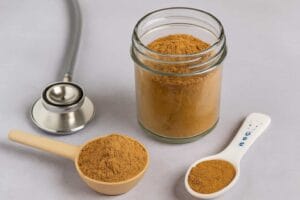Inflammation is an essential biological response that helps the body heal and defend against harmful stimuli. However, chronic inflammation can lead to various health issues, including arthritis, heart disease, and autoimmune disorders. This is where natural remedies like the Reishi Mushroom for Fighting Inflammation come into play. Known for centuries in traditional medicine, Reishi mushrooms offer a promising natural approach to managing inflammation and promoting overall wellness. In this article, we’ll explore how Reishi mushrooms work, their benefits, and how you can incorporate them into your daily routine. For those interested in other medicinal fungi, check out the health benefits of shiitake mushroom as well.
The Science Behind Reishi Mushroom for Fighting Inflammation
Reishi mushrooms, scientifically known as Ganoderma lucidum, have been revered in Eastern medicine for their numerous health benefits. Modern research has begun to validate these traditional uses, highlighting their potent anti-inflammatory properties. The key compounds responsible for these effects are triterpenoids, polysaccharides, and peptidoglycans, which work synergistically to modulate the immune system and reduce inflammation.
Inflammation is often driven by an overactive immune response, leading to tissue damage and pain. Reishi mushrooms contain bioactive compounds that help balance this response by:
- Inhibiting pro-inflammatory cytokines
- Enhancing antioxidant activity to neutralize free radicals
- Supporting immune regulation to prevent chronic inflammation
These mechanisms make Reishi mushrooms a valuable natural ally in fighting inflammation without the side effects commonly associated with pharmaceutical anti-inflammatory drugs.
Health Benefits of Reishi Mushroom for Fighting Inflammation
Beyond its anti-inflammatory effects, Reishi mushroom offers a wide range of health benefits that contribute to overall well-being. Here are some of the key advantages:
- Immune System Support: Reishi enhances immune function by stimulating white blood cells, which are essential for fighting infections and inflammation.
- Antioxidant Protection: The mushroom’s antioxidant compounds help protect cells from oxidative stress, a major contributor to chronic inflammation and aging.
- Stress Reduction: Reishi is an adaptogen, meaning it helps the body manage stress, which can otherwise exacerbate inflammatory conditions.
- Cardiovascular Health: By reducing inflammation and oxidative damage, Reishi supports heart health and may help lower blood pressure.
- Liver Detoxification: Reishi promotes liver function, aiding the body’s natural detox processes that can reduce inflammatory toxins.
These benefits make Reishi mushroom a holistic approach to health, addressing inflammation while supporting multiple bodily systems. For those interested in enhancing immunity alongside inflammation management, consider exploring Chaga mushroom gummies for immunity boost, which complement Reishi’s effects beautifully.
How to Incorporate Reishi Mushroom for Fighting Inflammation Into Your Routine
Reishi mushroom can be consumed in various forms, each with its own advantages. Here are some popular options and tips on how to use them effectively:
| Form | Description | Recommended Use |
|---|---|---|
| Powder | Dried and ground Reishi mushroom, often added to smoothies, teas, or capsules. | Start with 1 teaspoon daily; can be mixed with warm water or your favorite beverage. |
| Extract/Tincture | Concentrated liquid form, offering higher potency of active compounds. | Use according to label instructions; typically a few drops to one teaspoon daily. |
| Capsules/Tablets | Convenient for those who prefer a precise dosage without taste. | Follow dosing guidelines on the product; usually 1-2 capsules daily. |
| Tea | Traditional method of simmering dried Reishi slices in hot water. | Drink 1-2 cups daily; steep for at least 30 minutes for maximum benefit. |
Consistency is key when using Reishi mushroom for fighting inflammation. It may take several weeks of daily use to notice significant improvements. Always consult with a healthcare provider before starting any new supplement, especially if you have existing health conditions or are taking medications.
Potential Side Effects and Precautions
Reishi mushroom is generally considered safe for most people when used appropriately. However, some individuals may experience mild side effects such as:
- Dry mouth or throat
- Dizziness or lightheadedness
- Digestive upset
People with bleeding disorders or those on blood-thinning medications should exercise caution, as Reishi may affect blood clotting. Pregnant and breastfeeding women should also consult their healthcare professional before use.
Choosing high-quality Reishi supplements from reputable sources ensures safety and maximizes benefits. For a balanced approach to natural wellness, consider pairing Reishi with other medicinal mushrooms like Cordyceps, which can enhance energy and vitality. Learn more about Cordyceps mushroom gummies for energy boost.
F.A.Q
- What makes Reishi mushroom effective for fighting inflammation?
Reishi mushroom contains bioactive compounds such as triterpenoids and polysaccharides that modulate the immune system and inhibit inflammatory pathways. This helps reduce chronic inflammation naturally and supports overall health. - How long does it take to see results from using Reishi mushroom for fighting inflammation?
Results can vary depending on the individual and the severity of inflammation. Typically, consistent use for 4 to 8 weeks is recommended before noticeable improvements occur. - Can I take Reishi mushroom alongside other medications?
While Reishi is generally safe, it may interact with certain medications, especially blood thinners or immunosuppressants. It’s important to consult your healthcare provider before combining supplements with prescription drugs. - Is Reishi mushroom suitable for everyone?
Most people can benefit from Reishi mushroom, but those who are pregnant, breastfeeding, or have bleeding disorders should seek medical advice first. Also, individuals with allergies to mushrooms should avoid it. - Where can I find reliable information about Reishi mushroom for fighting inflammation?
For trustworthy and detailed insights, you can visit Healthline’s comprehensive guide on Reishi mushrooms. It covers benefits, uses, and scientific evidence supporting their role in inflammation control.



